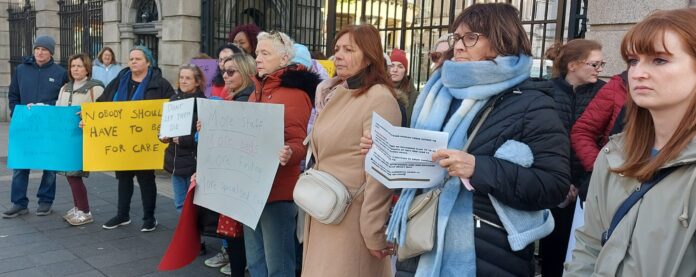
WHEN Sandra’s teenage daughter started cutting up raw vegetables to put in her school lunchbox, the Limerick mother was initially unconcerned and even impressed that the young girl was eating healthy.
However, in reality, there was far more to it.
“She had us fooled,” Sandra says. “She would sit down to eat dinner with us, but would only take a small amount of veg and no carbs. If I asked her if she would like more rice or potatoes, she said she’d already had some.”
At the age of 17, Sandra’s daughter Maria was an excellent student. She studied overtime to get the points she needed for a college place, she was helpful, kind, though somewhat worried on the run up to her exams.
Maria also had an eating disorder that eventually saw her drop to 40 kilograms. Her hair began falling out, fungal infections plagued her, and her mother and family had to face the horrible truth that her life was in danger.
“It hits you like a sledgehammer when you realise theres a problem. She just retreated from all of us. It’s like a curtain was pulled down,” she says.
A ‘nightmare’ journey
Once Maria was ready to face her disorder, she began a “nightmare” journey to try to get help, only to find there was none in the Mid West.
“Her GP said there was no point in sending her to CAMHS (Child and Adolescent Mental Health Services) because she hadn’t a hope of getting an appointment before she was classed as an adult,” Sandra told the Limerick Post.
“The only other option was to pay privately for psychiatric treatment, which is what we did, but that didn’t help.
“The next step was to get a place for her in St Patrick’s Hospital in Dublin, and that took a year and a half. There are absolutely no public supports for eating disorders in the Mid West,” the mother claimed.
“You’re actually told to go home with your child who is dying before your eyes and wait.”
Sandra got in touch with the Bodywhys organisation, who she says gave her a lost of counsellors and therapists, but none were available to take Maria on.
“At one stage, I was recommended a book to read about eating disorders and I remember trying to read it and crying because we were just abandoned. There wasn’t even a support group that we could find at the time because the whole thing is so stigmatised,” Sandra said.
“We were left with no support so we did what we could ourselves. I drove to her school every day and sat in the car with her while she ate a sandwich.
“We explored all kinds of therapies. It takes over your life and it’s the first thing on your mind when you wake up and all day.
“At one stage, the GP said she was so weak she shouldn’t be going to school. She was determined to get points to go to college and knew that she need to fuel herself to study. That was how she started eating again.”
After 18 months, Sandra and Maria got news that there was a place for her on an eating disorder programme at St Patrick’s Hospital in Dublin.
“They set up a team for her and she felt supported. But we had to wait all that time for that and there nothing could be done for her here in Limerick.”
Calling for better
Sandra said that Maria got the CAO points she wanted and is now in college and thriving.
Looking back on her daughter’s struggle, Sandra says that the lack of help in the Mid West “needs to be addressed because it could happen to anyone”.
The Limerick mother will be part of a local arm of a nationwide protest this Saturday (March 2), with members of the MindEverybody campaign lining out in Limerick, Cork, and Dublin to call for sweeping improvements in supports for those living with eating disorders.
The protests are calling for more direct routes to care and early intervention for those living with eating disorders, better clarity around the treatment process and patient entitlements, expansion of inpatient facilities, and the fast-tracking of the rollout of specialist facilities promised under the 2018 Model of Care.
The Limerick arm of the protest will take place from 11am on Saturday March 2 outside the gates of University Hospital Limerick.
In response to a query from the Limerick Post concerning the status of dedicated eating disorder teams in the Mid West, a HSE response said the following:
“The Mid West was not funded for adult or child eating disorder teams. We are due to have two teams (one for adults and one for children) serving the region.
“We have submitted a business case to the National Clinical Programme and it is most likely that we will receive a CAMHS eating disorder team in the first instance, before rolling out a team for adults.
“We are conscious that we are the only area without specific ED teams. In the meantime, we strive to ensure that children and adults presenting with eating disorders receive a clinically effective and timely service from our clinicians in the Mid West.
“We do have two advanced nurse practitioners in eating disorder working in CAMHS who support evidence-based, safe, and holistic assessment and management of eating disorders across our CAMHS teams.
“We also have a number of clinical nurse specialists who are carrying out family-based therapy and cognitive behaviour therapy (specific for eating disorders).
“Currently, children in the Mid West with eating disorders receive their community services in CAMHS. Adults with eating disorders receive their community services in the Adult Community Mental Health Teams.
“Most people can and do recover from eating disorders if they receive effective, evidence-based treatment from ED trained staff.
“While a small number of people benefit from more intensive treatment through day programmes or inpatient care, the most effective treatment setting is in the community.
“When an inpatient bed is required, adults can be referred by their treating consultant to our inpatient beds in our approved centres, Unit 5B and APU Ennis. Children and adolescents with an ED diagnosis who require inpatient treatment can be referred to the CAMHS inpatient-approved centre in Galway by their treating CAMHS consultant.
“On occasion, children and adults with eating disorder in the Mid West need to be medically admitted to ULHG, if the needs relate to the persons physical health. As the person begins to stabilise they will be seen by Liaison Psychiatry/CAMHS or treating mental health team”.
Information on how to access supports for those living with eating disorders is available from the Eating Disorders Association of Ireland on bodywhys.ie.









